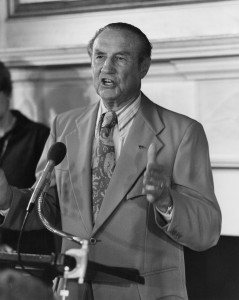 Race has played an underlying role in most national elections since former President Martin Van Buren ran on the Free-Soil ticket in 1848, splitting Democratic candidate Lewis Cass’s vote in New York State and helping facilitate the victory of pro-states rights Whig General Zachary Taylor.
Race has played an underlying role in most national elections since former President Martin Van Buren ran on the Free-Soil ticket in 1848, splitting Democratic candidate Lewis Cass’s vote in New York State and helping facilitate the victory of pro-states rights Whig General Zachary Taylor.
The role of race receded briefly in the post-Reconstruction era, as the Democratic Party snubbed blacks and the Republicans essentially ignored them for decades, in the wake of the Compromise of 1877.
 FDR had an interest in suppressing Democratic divisions on race throughout the 1930s in order to push his New Deal agenda. But race came roaring back in the 1940s, as Strom Thurmond’s Dixiecrats split from incumbent Democrat Harry Truman in 1948 to form a third (actually, fourth) party that year. Since then, racial issues have been salient in nearly every election.
FDR had an interest in suppressing Democratic divisions on race throughout the 1930s in order to push his New Deal agenda. But race came roaring back in the 1940s, as Strom Thurmond’s Dixiecrats split from incumbent Democrat Harry Truman in 1948 to form a third (actually, fourth) party that year. Since then, racial issues have been salient in nearly every election.
In 1960, JFK’s call to Coretta Scott King helped him win approximately two-thirds of the black vote, despite that fact that there was no real difference between his position and Nixon’s on civil rights. In 1964, civil rights was perhaps the primary issue cleavage, as Goldwater was staunchly opposed to the 1964 CRA pushed by LBJ, and consequently carried only his home state + the Deep South. In 1968 and 1972, Nixon’s “Southern Strategy” was premised on the white backlash against the civil rights movement. In 1980, Reagan went to Philadelphia, Miss., where three civil rights workers were brutally murdered in 1963, to kick off his 1980 general election bid and proclaimed that “the spirit of Jefferson Davis lives in this year’s Republican Party platform.” In 1988, Wille Horton became a household name. In 1992, Clinton successfully walked the racial tightrope: he signaled that he would not be co-opted by Jesse Jackson and, by proxy, the party’s African-American base by dissing Jackson via Sister Souljah at the Rainbow Coalition convention, but reassured blacks that he would “mend, not end” affirmative action. In 2000, Bush deftly alluded to race in his bid for suburban women (and perhaps a sprinkling of blacks) by decrying the “soft bigotry of low expectations that plagued urban schools. And in 2008…well, you know.
This year, of course, racial gaffes are highlighted by the presence of a black president. And so, much of America learned about Rick Perry’s old ranch, Ron Paul’s paean to the virtue of the Confederacy’s position, and that Rick Santorum assumption that all welfare recipients were…”blah.” Newt’s brilliantly repugnant use of Juan Williams as a foil to double down on the food stamp president meme may be the fin de siecle of this frightening yet unsurprising phenomenon; it is unsurprising because the Republican Party is reaping what it has sown after a generation of exploiting racial fears to build an Electoral College majority.
Race endures in this nation and will for the foreseeable future, as both a deep, painful wound slow to heal, and, regrettably, often as a sideshow that distracts from what ought to be the primary question around race: How can we marshal the political will (and the resources) eliminate the stubborn disparities in health, housing, education, and overall standard of living in a way that atones for the generations of labor and wealth that was stolen from blacks, and yet is politically palatable to a majority of the nation?









Leave a Reply